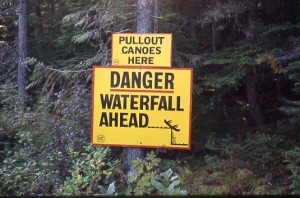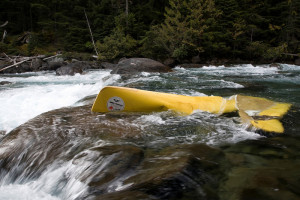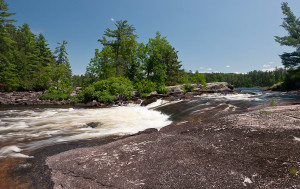The participant handbook for BSA’s Northern Tier canoe programs states as follows with regard to its “whitewater” policy:

“The running of rapids, whitewater or waterfalls is prohibited. All Northern Tier crews will portage around all falls, rapids, fast water, etc. During times of unusually high water it will be necessary to be very careful and watchful while traveling.”
This policy takes into account (1) the technical experience of attending crews, (2) the age and maturity level of attending crews, (3) the magnitude of possible injuries that may be suffered, (4) the likelihood of the occurrence of an injury, and (5) the difficulty of seeking immediate aid or assistance in the event of an injury suffered while attempting to traverse rapids. In essence, this is a policy put into place consistent with the principles of risk management in the outdoors.
A real life example of what can happen if a Boundary Waters canoeing group believes that it can avoid a portage by attempting to traverse a set of rapids is described in the following story, where a teen was trapped in the cold water of the rapids for over six hours, and whose survival was deemed fortunate:

It is incumbent upon Northern Tier crew advisors to understand the reasons behind such policies, make such reasons clear to the crew’s members, and ensure that procedures are in place to avoid placing the crew in peril when faced with the looming prospect of rapids (or waterfalls). The stated policy is presumably intended to avoid the need for a crew to make a judgment call regarding whether the crew can safely traverse rapids to avoid a portage.
Indeed, during one of the author’s risk management training sessions, one attendee commented that, during his crew’s Northern Tier experience, it was suggested by one of the crew members that perhaps they could avoid another portage by continuing to paddle down the river and traverse the rapids, despite the stated prohibition against doing so. The attendee remarked that cooler heads prevailed, despite the seemingly innocent rapids facing them, and portage they did.
This was probably not the first Northern Tier crew to confront such a decision, despite the stated policy.

Finally, there is this story regarding a Northern Tier crew which was swept over a waterfalls during their trek, as a result of canoeing too close to the falls, and whose crew members luckily survived without serious injury (but not without serious concern as to their physical well-being after being for a time trapped in a hydraulic at the bottom of the falls, and the loss of two canoes), also reported here.
Safe summer canoeing!
